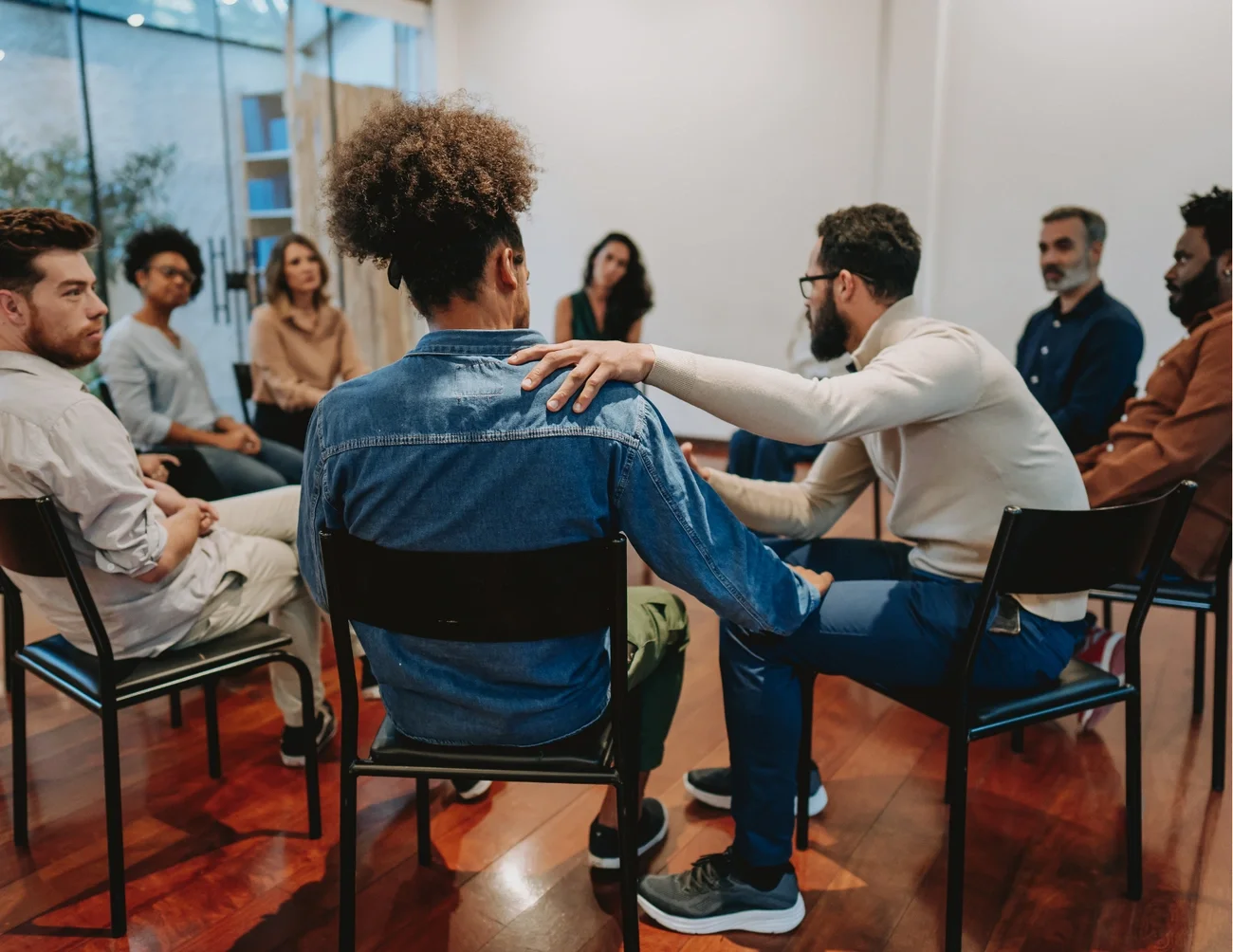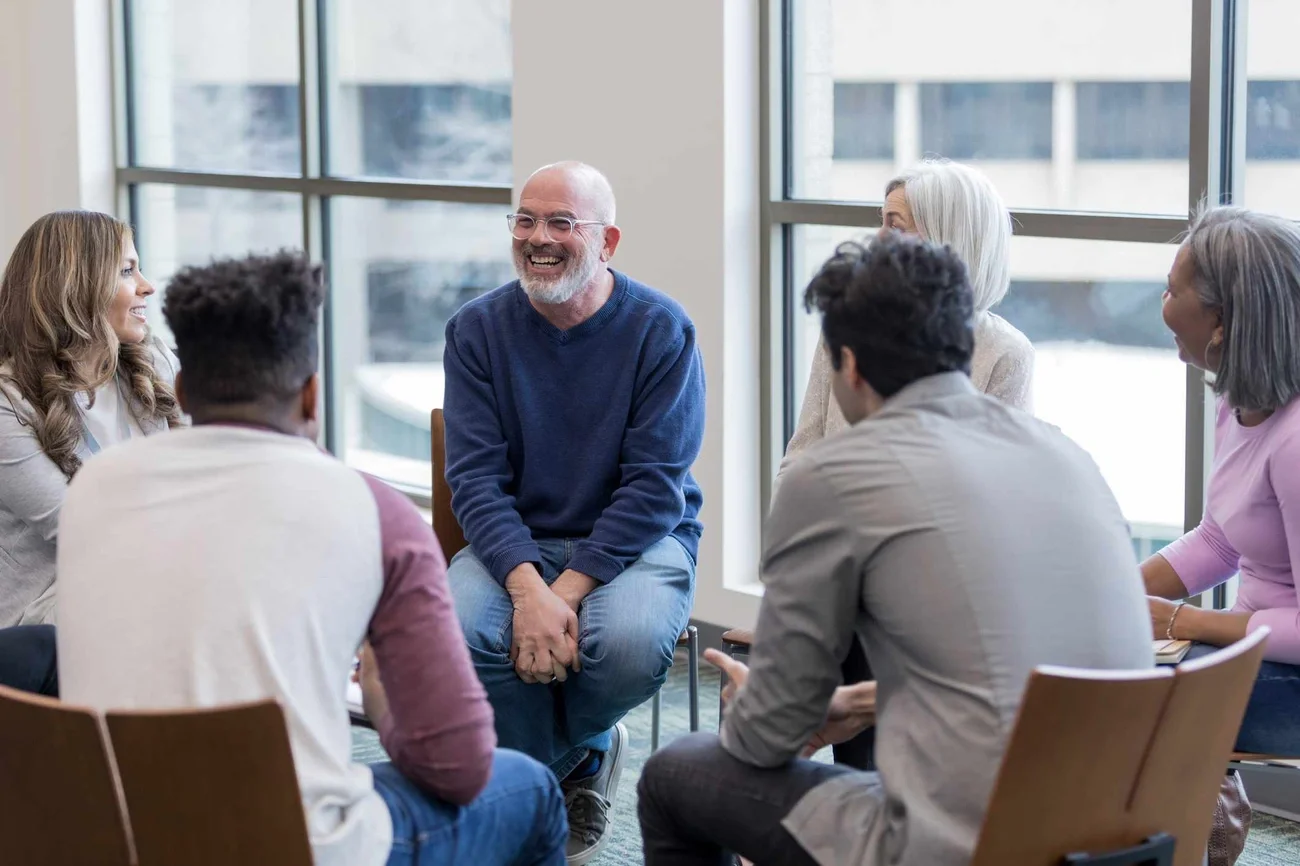Why Successful Therapists Still Need Consultation Groups in 2025
Research shows that therapist consultation and professional isolation correlate with burnout rates among mental health practitioners. Successful therapists benefit from regular peer support despite years of training and experience.
The mental health field has changed since the pandemic began. Anxiety and depressive disorders rose approximately 30% and clinicians report increases in patients' suicidal ideation. Peer consultation groups for therapists provide support and normalization around professional difficulties. Studies indicate that therapists participating in regular clinical consultation for therapists report higher job satisfaction and career longevity compared to those practicing in isolation.
Being licensed doesn't mean you have to go it alone. Isolation can develop in private practice, making peer consultation groups essential for processing complex cases and gaining diverse perspectives. "Mosh Pit has provided me with strong friendships, support and colleagues to go to for quick consultation," notes one therapist who was awarded Counselor of the Year by the Ohio Counseling Association. These connections help therapists develop cultural sensitivity and competence when working with diverse populations.
We'll explore why even the most successful therapists need ongoing consultation, how these groups benefit both clinicians and clients, and practical steps for finding or creating your own supportive professional community.
Why even experienced therapists need consultation groups
The American Psychological Association's ethical guidelines require psychologists to obtain professional consultation when personal problems may interfere with professional duties. This challenges a dangerous assumption many experienced clinicians make, that expertise eliminates the need for peer input.
The myth of 'going it alone'
Therapy can be profoundly isolating. Many practitioners describe their work as "starving in a sea of other lonely people that you can't reach out to". One therapist shared, "I see people all day but they are not relationships of equality and give-and-take".
The emotional toll is significant, therapists experience secondary trauma, compassion fatigue, or burnout from working with clients who have experienced significant trauma or distress. Research suggests therapists who participate in consultation groups are less likely to struggle with isolation and burnout.
The pandemic has intensified this isolation. Remote work and social distancing have reduced the casual encounters that would have allowed for informal consultation between therapists. One clinical supervisor noted, "Without dedicated time and space for consultation, psychologists may not adequately address the intersection of the professional and personal issues that contribute to burnout".
How peer consultation differs from supervision
Consultation relationships tend to be egalitarian and nonevaluative compared to supervisory relationships where the supervisor holds legal responsibility and oversees the supervisee's patients. Clinical supervision may require additional documentation such as learning plans, formal documentation of hours, and recording of client sessions.
Clinical consultants accept a lower level of liability than clinical supervisors. Consultation is self-directed and mutually shares the task of leadership, where members determine their own needs and seek support according to personal requirements.
Both aim to support therapists' growth as practitioners and enhance client care, but consultation can continue throughout a therapist's career rather than ending after licensure requirements are met.
Why post-licensure support still matters
Once licensed, many therapists underestimate the value of ongoing clinical consultation. Vulnerability to cognitive biases increases when working in isolation. Psychologists in independent practice reported a median of 12 sessions with a non-progressing patient before considering consultation.
Without peer input, therapists may rely too heavily on personal clinical experience versus evidence-based research or collegial advice in treatment decisions. One participant in a successful consultation group stated, "Having multiple perspectives has provided me with great case conceptualization for better client outcomes".
Clinical consultation benefits include:
Reducing isolation and burnout by promoting community and connection
Expanding knowledge base and improving ability to conceptualize cases
Creating safe spaces to discuss ethical dilemmas
Increasing awareness of biases and engaging in critical thinking
Schedule one consultation per month, even if nothing feels urgent. Growth thrives in connection, not crisis.
Most regulatory bodies encourage ongoing therapist-to-therapist mentorship, regardless of a therapist's stage of registration or licensure. This recognition acknowledges that even the most skilled clinicians benefit from professional community.
The emotional and professional benefits of peer consultation
Peer consultation provides more than case advice. It serves as a professional learning community and support system for therapists at any career stage.
Reducing burnout and isolation
The pandemic has increased professional and personal demands on psychologists, resulting in higher levels of burnout and clinician isolation. Without adequate consultation, this burnout may impair a therapist's ability to provide quality clinical care.
One therapist described being in "survival mode just trying to get through the next 24 hours" while juggling a heavy caseload alongside family responsibilities. Peer consultation groups counter isolation and burnout by promoting community, collegiality, and connection.
Therapists who participate in consultation groups are less vulnerable to professional isolation. One psychologist noted about her peer group: "Mosh Pit is part of my wellness plan. Our group is funny and kind, and the meetings are something I look forward to rather than dread". This mix of professional support with personal connection helps maintain motivation and prevents emotional exhaustion.
Schedule one consultation per month, even if nothing feels "urgent." Growth thrives in connection, not crisis.
Building confidence and clinical clarity
Peer consultation enhances clinical confidence. Many successful, intelligent therapists struggle with feelings of inadequacy, wondering if they'll be "discovered as inadequate" by those around them.
Peer groups combat these insecurities through objective feedback and validation. One therapist shared: "It helps with case conceptualization. We bring our difficult and successful cases to consultation to gain insight and peer input, which leads to professional growth and better client outcomes".
Regular participation in consultation helps therapists:
Process difficult cases and reduce decision fatigue
Discuss countertransference, cultural responsiveness, and ethical ambiguities
Expand their knowledge base and improve ability to conceptualize cases
Maintain passion for their work while alleviating fears about being judged
Peer consultation creates a paradigm shift in understanding wellness as a communal factor versus just "self-care".
Creating a safe space for vulnerability
Peer consultation groups must establish psychological safety. Successful groups are non-hierarchical, non-evaluative, and non-judgmental, yet also honest and confidential.
These norms create a safe environment where therapists can be vulnerable about clinical challenges or personal processes. This proves valuable during challenging periods; clinicians often find comfort in having colleagues affirm the toll a challenging case is taking on them.
Safety is fundamental to therapeutic growth, both for clients and therapists. The workplace should not be a place for expending energy but rather for getting "recharged, motivated, and inspired".
A safe consultation group encourages members to openly share mistakes and struggles by normalizing therapists' emotional reactions alongside clinical challenges. This atmosphere allows practitioners to explore vulnerable domains of experience while facing uncertainties with greater confidence.
For therapists in private practice, these connections become crucial. Being your own boss has perks, yet the lack of regular collegial support takes a toll on both mental wellness and clinical skills, potentially leading to impostor syndrome and eventual burnout if not addressed.
How consultation groups improve client outcomes
Consultation groups enhance client care through collaborative wisdom. Quality consultation offers therapists new insights that translate into more effective treatment plans and clinical interventions.
Better case conceptualization through diverse input
Case conceptualization ranks as a fundamental clinical competency. Workshops often lack sufficient time to develop this crucial skill thoroughly. Consultation groups help therapists refine this ability by gaining multiple perspectives on complex cases.
"Having more eyes on a problem promotes novel solutions," notes one therapist. These diverse viewpoints help clinicians move from abstract knowledge about case conceptualization to case-specific clinical implementation. The process becomes particularly valuable when working with clients from different cultural backgrounds or with complex presentations.
Competent case conceptualization should be comprehensive, understandable, coherent, science-informed, and ultimately connected to measurable outcomes. Peer feedback helps ensure these elements are addressed, ultimately improving treatment effectiveness.
Ethical decision-making with peer support
Ethical dilemmas arise regularly in therapy practice. Consultation provides clarity in these gray areas. One therapist explains, "Not every situation is black and white. If we are stuck, we look it up or ask our state ethics representative for help".
Peer consultation groups offer a supportive, collaborative forum for discussing ethical challenges. This process allows therapists to explore various perspectives before making difficult decisions. Groups that foster psychological safety create space where members can discuss ethical concerns without fear of judgment.
Staying current with new modalities and research
The field of mental health evolves rapidly. Consultation groups function as knowledge-sharing communities where members exchange information about emerging research and treatment approaches.
"We teach each other new skills and help with skill improvement," shares one practitioner. Another therapist values having "clinicians with varied theoretical expertise who share how they would conceptualize a case". This helps therapists apply skills in more strategic or trauma-informed ways.
Groups often discuss local, state, and national updates related to mental health, ensuring members stay informed about policy changes affecting their practice. This ongoing education directly benefits clients, who receive treatment informed by current best practices.
Schedule one consultation per month, even if nothing feels "urgent." Growth thrives in connection, not crisis.
Consultation groups serve a dual purpose, supporting therapist wellbeing while enhancing client care through improved clinical decision-making, ethical practice, and treatment innovation. For therapists in private practice, these professional connections provide an essential lifeline that translates to better client outcomes.
What makes a consultation group effective
Effective peer consultation requires planning and structure. Productive consultation groups follow specific formats that support learning among members.
Group structure and meeting frequency
Consultation groups typically include 4-8 members, allowing participation without overwhelming contributors. Groups meet weekly to monthly, with most effective groups gathering at least twice monthly to maintain continuity. Sessions span 90-180 minutes, providing time for case exploration.
Some groups use an open format where new members can join anytime. Closed groups permit new participants during specific periods or under certain circumstances. Structure should align with members' goals, case review, professional development, or both.
Creating psychological safety and trust
Peer consultation groups must establish psychological safety. Effective groups are non-hierarchical, non-evaluative, honest and confidential. These elements create an environment where therapists feel comfortable being vulnerable about clinical challenges or personal processes.
Time for personal introductions and establishing group norms helps build trust, particularly when members have varying relationship histories. Ground rules provide structure and set the tone for respectful interactions. One therapist noted, "How you respond to others will help set norms, and show group members how you want them to respond to you".
Balancing support with constructive feedback
Effective groups maintain balance between support and challenge. Groups where vulnerability is welcomed, feedback is both challenging and supportive, and differing perspectives are valued foster learning.
Groups may fall into pitfalls without this balance. Some become overly supportive without providing constructive feedback, while others focus on advice-giving without adequate reflection. Successful consultation groups value both content and process, providing feedback on clinical cases while exploring consultees' emotional reactions.
Virtual vs. in-person formats
The pandemic hastened the transition to remote consultation formats. Many clinicians now participate in both formats to use the advantages of each approach.
Virtual formats eliminate travel time, making consultation more accessible. Videoconferencing platforms offer benefits, such as screen-sharing capabilities that allow members to present completed worksheets to the entire group. Some therapists report feeling less connected in virtual environments. A hybrid model has emerged where local therapists meet in person when possible but incorporate virtual options for scheduling conflicts.
How to find or start your own peer consultation group
Finding the right peer consultation group starts with understanding what you need from collegial support. The path to meaningful professional connection requires intentional steps whether joining an existing group or creating your own from scratch.
Identifying your goals and needs
Determine what type of consultation you seek. Consider whether you prefer a relaxed discussion format or structured clinical focus. Reflect on whether you want ongoing support or case-specific consultation. Virtual options allow for lunchtime meetings, while in-person formats foster different types of connection.
Where to look for existing groups
Professional organizations often organize established peer support options. Consider these resources:
Local psychological associations
Professional networking events and conferences
Alumni groups from graduate programs
Online therapist forums and social media groups
Tips for starting a therapist consultation group from scratch
Creating your own group represents a viable alternative for those unable to find suitable existing groups. Choose a specific purpose before members meet for the first time. Decide between open or closed membership structures. Determine ideal group size, typically 4-8 members allows balanced participation.
Setting expectations and group norms
Successful consultation groups adhere to clear guidelines. Create a group contract outlining confidentiality agreements, meeting structure, and communication expectations. Establish a culture of non-judgment that allows for vulnerability yet provides honest feedback.
Schedule one consultation per month, even if nothing feels "urgent." Growth thrives in connection, not crisis.
Isolation poses a significant risk in private practice. Finding or creating the right peer consultation group offers a powerful antidote to professional loneliness while enhancing clinical expertise.
Conclusion
Mental health practice continues to change, yet therapists need meaningful professional connection. Consultation groups serve as lifelines for practitioners at every career stage. Many clinicians believe expertise eliminates the need for peer support, but evidence demonstrates otherwise.
Regular consultation extends beyond case advice. These groups combat professional isolation, reduce burnout risk, and provide safe spaces for vulnerability. Therapists who participate in consultation report greater job satisfaction and career longevity compared to those practicing alone. These connections help practitioners maintain clinical clarity while building confidence in their therapeutic approaches.
Clients benefit from their therapist's participation in consultation groups. Better case conceptualization, enhanced ethical decision-making, and exposure to emerging research translate directly into improved treatment outcomes. Diverse perspectives within these groups help therapists develop greater cultural sensitivity when working with varied populations.
Effective consultation groups require thoughtful structure, established norms, and commitment to psychological safety. Whether meeting virtually or in-person, the most successful groups balance supportive validation with constructive feedback, creating environments where growth occurs.
Professional isolation poses a genuine threat, especially for those in private practice. Finding or creating the right consultation community represents a critical investment in both personal wellbeing and clinical excellence. Being licensed doesn't mean you should practice in solitude.
Schedule one consultation per month, even if nothing feels "urgent." Growth thrives in connection, not crisis. This simple habit can improve your professional experience while enhancing client care through improved decision-making and treatment practices.
The most successful therapists understand that excellence comes through intentional connection with trusted colleagues. When we view consultation as essential rather than optional, we reach our full potential as practitioners while modeling the very connection we encourage in our clients.
Key Takeaways
Even the most experienced therapists benefit from ongoing peer consultation, which combats isolation while enhancing both clinical skills and client outcomes through collaborative wisdom and professional support.
• Consultation groups reduce burnout and isolation by creating supportive professional communities that provide emotional validation and diverse clinical perspectives.
• Client outcomes improve significantly through better case conceptualization, enhanced ethical decision-making, and exposure to current research and treatment modalities.
• Effective groups require intentional structure including 4-8 members, regular meetings, psychological safety, and clear norms balancing support with constructive feedback.
• Professional isolation poses genuine risks especially in private practice, making consultation groups essential investments in both therapist wellbeing and clinical excellence.
• Schedule monthly consultation sessions even when nothing feels urgent, growth thrives through connection, not crisis, and regular peer input prevents cognitive biases from developing.
The most successful therapists understand that clinical excellence isn't achieved through independence but through intentional interdependence with trusted colleagues who provide ongoing support, challenge assumptions, and share collective wisdom.
FAQs
Q1. Why do experienced therapists need consultation groups? Even seasoned therapists benefit from consultation groups to combat professional isolation, reduce burnout, and gain diverse perspectives on complex cases. These groups provide emotional support and help therapists stay current with new research and treatment modalities.
Q2. How do consultation groups improve client outcomes? Consultation groups enhance client care by providing therapists with multiple perspectives for better case conceptualization, supporting ethical decision-making, and exposing therapists to current research and innovative treatment approaches. This collaborative wisdom directly translates to more effective treatment plans.
Q3. What makes an effective consultation group? Effective consultation groups typically have 4-8 members, meet regularly, establish psychological safety, and balance supportive validation with constructive feedback. They create an environment where therapists can be vulnerable about clinical challenges while receiving honest, non-judgmental input.
Q4. How often should therapists participate in consultation? It's recommended that therapists schedule at least one consultation session per month, even if there are no urgent issues. Regular participation helps prevent isolation, maintains clinical skills, and fosters professional growth through consistent peer interaction.
Q5. Can consultation groups be conducted virtually? Yes, many consultation groups now operate in virtual or hybrid formats. While some therapists prefer in-person meetings for better connection, virtual options offer benefits like increased accessibility, eliminated travel time, and unique features such as screen-sharing for presenting case materials.
If you are interested in working with one of the supervisors at VitalMinds. Click the link below to get started.




